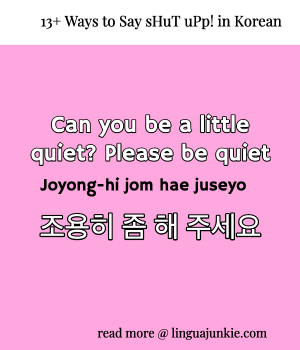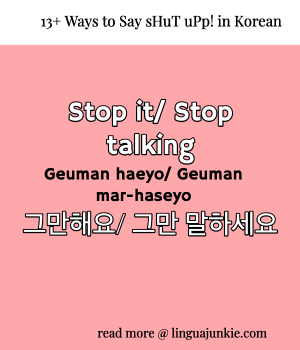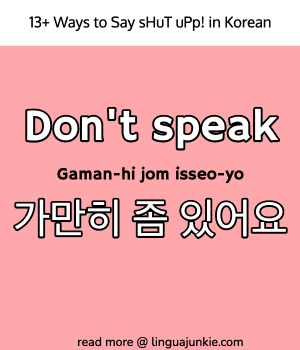There are a few ways you can say shut up in Korean.
From very polite ways to very rude ways.
“Shikkeureo-woyo” is one of them.
But in this guide, you will learn 13+ ways to say shut up in Korean depending on the context along with romaji and translations. So, sit down, shut up, eat your vegetables… and read on, okay?

1. 조용히 좀 해 주세요
- Joyong-hi jom hae juseyo
- Can you be a little quiet?/ Please be quiet
This is a somewhat polite way to ask someone to keep quiet in Korea. However, the perceived politeness depends on your tone, even if the verb-ending is formal (해 주세요). Saying this in an aggressive tone expresses annoyance. If you use a softer tone, you are simply requesting them to ‘keep it down’.

The informal version is 조용히 좀 해 줘.
× Example:
- 애들 시험 보는데. 조용히 좀 해 주세요.
- Aedeul siheom boneunde. Joyong-hi jom hae juseyo
- The kids are taking exams. Please be quiet.
2. 그만해요/ 그만 말하세요
- Geuman haeyo/ Geuman mar-haseyo
- Stop it/ Stop talking
You can use these phrases to put a stop to rants or arguments. People usually say this out of frustration, but some also say it when they get overdosed with compliments, because it shows humility.

The informal version is 그만해/ 그만 말해.
× Example:
- 다들 그만 말해 이제!
- Dadeul geuman marhae ije
- Everyone stop talking now!
3. 가만히 좀 있어요
- Gaman-hi jom isseo-yo
- Do not speak
Although it literally means ‘stay still’, it also means ‘do not speak’. You can use this in contexts where you want to calm an angry person, or a loudmouth friend who is giving away secrets.

The informal version is 가만히 좀 있어.
× Example:
- 당신 가만히 좀 있으라고요!
- Dangshin gaman-hi jom isseu-ragoyo!
- I said do not speak!
4. 시끄러워요
- Shikkeureo-woyo
- Shut up
This is a commonly used but impolite way of asking someone to shut up in Korean. It literally means ‘it’s noisy’ or ‘you’re noisy’ and so it is also used to express annoyance at noisy objects or people.

The informal version is 시끄러워.
× Example:
- 시끄럽다 진짜!
- Shikkeu-reobda jinjja!
- It’s so noisy, seriously!
5. 여기까지만 해요
- Yeogi-kkaji-man haeyo
- That’s enough
When someone goes overboard or overreacts, this phrase comes to save the day. If you see someone continuously throwing harsh remarks towards a person or situation, you can use this phrase to stop them.
The informal version is 여기까지만 해.
× Example:
- 여기까지만 해요, 말이 지나치시다.
- Yeogi-kkaji-man haeyo, mari jinachi-shida
- That’s enough, you’ve crossed the line with your words.
6. 조용히 해라/ 조용히 안해?
- Joyong-hi haera/ Joyong-hi anhae?
- Shut up/ You won’t shut up?
The meaning is almost the same as 조용히 좀 해 주세요, but you can use these sentences to warn someone to shut up in Korean. The listed phrases have informal and impolite verb-endings, thus, they should be addressed to people the same age or younger than you.
× Example:
- 야 너 조용히 안해?
- Ya, neo joyong-hi anhae?
- Hey, won’t you shut up?
7. 입 다물어
- Ib damureo
- Shut your mouth/ Zip it up
You can use this phrase to silence someone in a very straightforward way. It is common to use it as an angry ‘shut your mouth’ phrase, but it is also used when you want someone to keep a secret. Except, you would be threatening them to keep the secret.
× Example:
- 꼭 입 다물고 있어야돼, 알았어?
- Kkok ib damulgo isseo-yadwae, arasseo?
- You have to keep your mouth shut, understood?
8. 입 닥쳐/ 닥치라고
- Ib dakchyeo/ Dakchi-rago
- Shut the hell up
It is seen as improper to say this to anyone other than your close friends/siblings. Even then, it should only be used when you are immensely frustrated or angered.
× Example:
- 닥쳐 이 미친 놈아!
- Dakchyeo i michin nom-a!
- Shut up, you crazy dude!
9. 아가리 닥쳐라
- Agari dakchyeora
- Shut your trap
A highly inappropriate way to say shut up in Korean. It is not common but you can spot this phrase in intense movie scenes. It is disrespectful in any context, so be careful to not use it when joking around.
× Example:
- 아가리 닥치고 저리가!
- Agari dakchigo jeori-ga!
- Shut your trap and go away!
10. 아 좀!
- Ah jom!
- Please!
You can say this when you are exasperated with something or someone. This is a short expression which literally means ‘oh please’. It is informal but not disrespective, and can be used among friends, family or anyone close to you.
× Example:
- 아 좀! 그대로 냅둬 좀!
- Ah jom! Geudaero naebdwo jom!
- Please! Just leave it alone!
11. ____얘기 좀 그만해요
- ____ yaegi jom geuman haeyo
- Stop talking about ____
It is indeed frustrating when someone keeps talking about the same thing for a long time. This phrase comes in handy to get them to stop. Anything can be inserted in the blank space according to the situation.
The informal version is ____ 얘기 좀 그만해.
× Example:
- 아 그놈의 상사 얘기 좀 그만해!
- Ah geunom-ui sangsa yaegi jom geuman hae!
- Oh stop talking about that damned boss!
12. 말 다 했어?
- Mal da haesseo?
- Are you done talking?
This rhetorical sentence is used to express offence taken at someone’s words. It is often said by a person who has just been insulted. You can also use it to display shock at someone’s insensitive words.
× Example:
- 얘 좀 봐라! 야, 너 말 다 했어?
- Yae jom bwara! Ya, neo mal da haesseo?
- Look at this kid! Hey, are you done talking?
13. 신경 끄세요
- Shingyeong kkeuseyo
- Mind your own business
When you want to ask someone who is meddling in your business to shut up, this is the best way to do it. Because it literally means ‘quit your attention’ or ‘stop caring’, it’s not considered very impolite, although it depends on the tone again.
The informal version is 신경 꺼.
× Example:
- 제가 알아서 할테니까 신경 끄세요.
- Jega araseo haltenikka shingyeong kkeuseyo
- I’ll handle it myself so mind your own busin
Shut up in Korean Conclusion
Now you know how to say SHUT UP and BE QUIET in Korean.
Wasn’t hard, right?
These are really fun phrases to know, just like bad Korean words and angry Korean phrases.
– The Main Junkie
